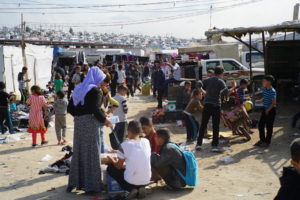The Yazidi Genocide Explained
24/02/21
What is Genocide? Genocide is the deliberate killing of a large number of people from a particular nation or ethnic group. The Yazidi Genocide saw the torture, murder, enslavement, imprisonment, abduction and exploitation of Yazidi men, women and children by IS forces, in 2014.
Background
The Yazidis practise an ancient gnostic faith, a religion in which ISIS view its followers as infidels. Being a relgious minority in Iraq, Yazidis have faced persecution, discrimination and marginalisation for centuries, long before the Yazidi Genocide of 2014.
‘Convert or be Killed’
In August 2014, ISIS fighters launched a series of attacks against Yazidi people living in the Sinjar region, northern Iraq. IS forces violently surged Yazidi homes, destroying their communities and murdering their families. Thousands were executed and abducted. Yazidi villages, shrines and holy sites were burned to the ground, and their cultural heritage was torn apart. The ultimatum to ‘convert or be killed’ was forced upon Yazidi people by ISIS. For those male Yazidis who refused to convert, they were sent to mass execution sites, whilst women and children were abducted. Still to this day, mass graves of murdered Yazidis are being discovered.
Upon ISIS’ arrival to the Sinjar region, around 50,000 Yazidis fled their villages into the valleys of the Sinjar Mountain to avoid capture and seek refuge. As IS forces enveloped the mountains, Yazidi people were trapped without food, water and medical care. Whilst some were rescued by Kurdish forces and others travelled back to their villages, many chose to stay living in the mountains due to the fear of exposure. Despite humanitarian aid efforts to support those closed in by ISIS, many children, the elderly and people with disabilities died of starvation and dehydration.
Yazidi Women & Children
During their attacks against Yazidi villages, ISIS abducted Yazidi women and children. An estimated 7,000 women and girls were abducted, enslaved and transferred to locations in Iraq and eastern Syria. Female Yazidis were sold into sexual slavery, forced into marriage with ISIS fighters and faced brutal sexual and physical violence. Treated as currency, Yazidi women and children were frequently exchanged for goods between ISIS fighters and families. Simultaneously, young Yazidi boys were abducted and turned into child soldiers via ISIS training camps. As of now, Yazidi women and children are still held captive by IS families. More than 3000 are still missing.
The Lasting Effect
Internally Displaced People (IDPs)
ISIS’ actions against the Yazidi population has resulted in hundreds of thousands of Internally Displaced People (IDP). But what does this mean? An internally displaced person is someone who has been forced to flee their habitual residence due to varying reasons, including conflict, violence, persecution or natural disasters.
Despite the defeat of ISIS, the physical and psychological effect of their inhumane actions is ever-lasting and thousands of Yazidi people, men, women and children alike, are still missing. The majority of those who survived the Genocide are now living in IDP camps in Iraq’s northern region of Iraqi Kurdistan. However, some Yazidi women and children are still living with their IS families in separate camps. Many of these women are too afraid to admit that they’re captives or slaves of IS forces, and other Yazidi IDP’s won’t return back to their communities due to the fear of persecution.
Life in IDP Camps
Life in the camps isn’t easy. Freezing temperatures in the winter and with summers always in the high 40’s, living in a tent can be unbearable a lot of the time. The education system is below par with the rest of Iraq and Kurdistan, relying heavily on volunteer teachers. This puts the young people in camps at a major disadvantage to other young people; unemployment is rife. Nonetheless, there is a high suicide rate amongst Yazidis living in IDP camps and this is due to the lack of available psychiatric and psychosocial support. The impact of the Yazidi Genocide has caused severe mental health problems amongst the surviving Yazidis, with PTSD, depression and anxiety disorder all common illnesses.
SCOOP’s Work
The SCOOP Foundation have been working in Bajed Kandala Camp, Iraqi Kurdistan, since 2016. SCOOP supported Joint Help For Kurdistan (JHK), a not-for-profit organisation founded in 2014 by Kurdish-Swedish doctors and humanitarians, and set up a psycho-social support programme to assist Yazidis who had been most affected by the genocide of 2014. Later in 2017, SCOOP established an art therapy programme and in 2018 began SCOOP Ed, a platform to teach young people all aspects of IT and design. SCOOP also supports the general operations of the health clinic operated by JHK.


